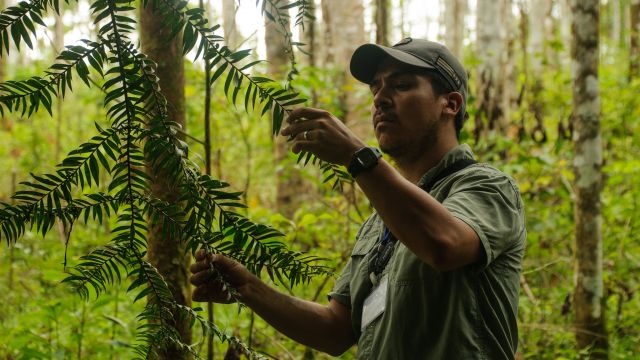This article originally appeared at World Resources Institute Insights here.
For most projects, restoring 20 million hectares (49 million acres) of forest sounds like enough. But Walter Vergara, coordinator of Initiative 20x20, describes that as only their "short-term" goal. The long-term goal is even more ambitious: to change the dynamics of land degradation throughout Latin America.
In this podcast, WRI Vice President for Communications Lawrence MacDonald interview Vergara, a senior fellow with WRI's Forests program, and Etienne Demarais is CEO of URAPI Sustainable Land Use, a fund created to invest in land restoration.
Initiative 20x20 is a country-led effort that involves 17 countries from Mexico all the way south to Chile. It supports the Bonn Challenge, a global challenge to bring 150 million hectares of the world's deforested and degraded land into restoration by 2020. Restoring degraded land in Latin America can bring billions in economic benefits. WRI has chronicled success stories in Brazil, Panama, Costa Rica and more.
How does Initiative 20x20 restore land? Landscape restoration includes five categories:
1. Landscape management, including agroforestry and silvopastures
2. Low-carbon agriculture also associated with agroforestry
3. Reforestation
4. Grassland restoration
5. Avoided deforestation
The last is the cheapest. "If we stop the damage before it is done, it's one of the most cost-effective ways to protect the land," Vergara explains.
However, when restoration is required, money is necessary. "How do you mobilize the money when returns might be far in the future, or they might be diffuse---they might be benefits to society, but not something that investors can easily take hold of?" MacDonald asked.
URAPI is one of the partners that make this possible. "URAPI was created to invest through cooperatives of small farmers," Demarais said. "We work with the farmers in the design of the project. We co-design the project bottom-up with the farmers."
Demarais outlines one such project, the Café Silva Norte project in northern Peru, for listeners. Land there has been depleted by slash-and-burn that reduces the land's productivity. "It's a partnership between URAPI and four coffee cooperatives, involving 2,000 farmers, 20,000 hectares of reforestation and avoided deforestation. URAPI is, through a microcredit intermediary, financing the land's transition to full coffee-growing agroforestry," Demarais explained. "We also invest in equipment, infrastructure, commercialization platforms and carbon finance to generate new revenues."
The 17 countries in the Initiative have now pledged an ambition to restore 50 million hectares. "That's more than double the original area," Vergara said. "I'm very happy to report there are now in excess of 100 projects that have initiated work on more than 14 million hectares. We still have about 20 months to go. The momentum is increasing. I'm very confident we will get there."
Listen to the podcast:
